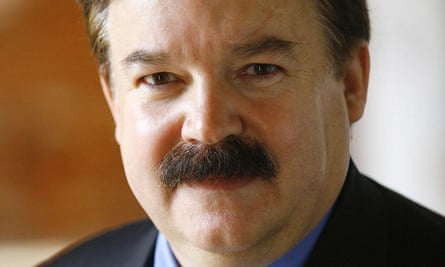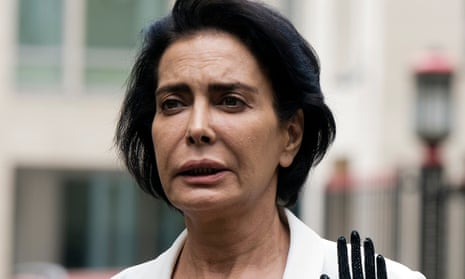A retrial has been ordered of a £20m claim against the family of King Fahd of Saudi Arabia by his secret Palestinian wife after a controversial judge was criticised for serious “shortcomings” in dealing with the evidence.
The ruling by the master of the rolls, Lord Dyson, is a setback for the high court judge Mr Justice Peter Smith who is under investigation for his conduct in a separate case and is voluntarily refraining from sitting in any hearings.
Palestinian-born Janan Harb, 68, was awarded £12m in cash and two properties in Cheyne Walk, Chelsea, in a judgment given by Smith last November.
Born to Christian parents, she had moved to Jeddah, Saudi Arabia, in 1967 where she met Fahd. They married the following year after she converted to Islam. The relationship broke down and she left Saudi Arabia in 1970.
In sharia law, she remained married to Fahd, who suffered a stroke in 1995 and became incapacitated. Harb, who married twice subsequently, began to run short of money and met Prince Abdul Aziz bin Fahd, the king’s son by another wife, in Marbella.
She told him she planned to publish her autobiography which would inevitably disclose details of her relationship with the king and the royal household. She was paid £5m to not publish.
By 2003, Harb’s finances were low again. She saw the prince at the Dorchester hotel in London. Harb maintains that at that meeting she agreed to retract comments in a legal affidavit about King Fahd’s drug-taking and in return she had been promised £20m in cash and properties.
Lawyers for the prince dismissed her account, saying Harb had accosted him in the hotel lobby but he did not speak to her and there was no agreement.
In the high court, Smith accepted Harb’s account and found that a binding contract had been made in her favour. He also rejected the prince’s argument that he was not personally liable because he had only been an agent acting for the king.
Lawyers for the prince asked the court of appeal judges – Dyson, Lord Justice Moore-Bick and Lord Justice McFarlane – to quash that “unsustainable” award.
Delivering judgment that there should be a retrial before a different high court judge, Dyson said Smith’s handling of the evidence had fallen below the required standards.
“The court has concluded that the shortcomings in the way in which the judge dealt with the evidential issues in the case were so serious that the appeal must be allowed for that reason,” Dyson said. “It has also concluded that the appeal must be allowed on the agency issue.”
Smith’s “approach to the evidence was unsatisfactory in a number of significant respects,” the court of appeal said. “The judge failed to draw together the evidence from the various different sources and analyse it in order to make his findings in relation to individual issues”.
The judgment added: “A party in a case of this kind is entitled to expect that the judge will engage with the arguments advanced on his behalf and, insofar as the case turns on the facts, deal fully with the evidence and explain how he has come to his conclusions ... the judge failed to do this adequately in this case and the appeal must be allowed.”
But Dyson rejected an allegation of “apparent bias” made against Smith. The judge had written a “shocking letter revealing possible bias” against Blackstone Chambers, the legal chambers that provided the barristers representing the prince, the court heard.
The letter was prompted by a newspaper article by Lord Pannick QC, a member of the chambers, who appeared for the prince at an early stage in the Harb case.
Pannick’s article criticised the judge’s handling of an unrelated case involving British Airways, in which the judge recused himself after demanding to know what had happened to his own luggage on a flight home from Florence.
Pannick had written that the case “raises serious issues about judicial conduct that need urgent consideration by the lord chief justice”.
In response, the judge wrote to Anthony Peto QC, one of two heads of Blackstone Chambers, saying: “The quite outrageous article of Pannick caused me a lot of grief and a lot of trouble.”
He added: “I will no longer support your chambers; please make that clear to members of your chambers. I do not wish to be associated with chambers that have people like Pannick in it.”
Lawyers for the prince told the appeal judges that the “shocking and indefensible” letter was clear evidence of possible bias against the chambers and could have affected the outcome of the Harb case.
Dyson said one ground of appeal was that there was an appearance of bias on the part of the judge against the prince’s counsel, and thereby against the prince himself.
But, he added, although the appeal court “is very critical of the judge for writing the letter”, it had concluded that “the informed and fair-minded observer would not conclude that there was a real possibility” that the judge was biased against the prince.
A spokesman for the judiciary said later: “Mr Justice Peter Smith has agreed to continue to refrain from sitting at the present time.”
A spokesman for the Judicial Conduct Investigations Office said: “The JCIO investigation into the BA matter is continuing. If there is a finding against any judicial office holder, a statement is published on the JCIO website. Legal proceedings are separate from the JCIO process, but a matter connected to this appeal is under investigation by the JCIO.”

Steven Morris, a partner at the law firm Howard Kennedy who represents the prince, said: “The prince is delighted that the appeal has been allowed and that the judgment of Mr Justice Peter Smith has been set aside in its entirety. The judgment of Mr Justice Peter Smith was unsatisfactory for the reasons explained by the court of appeal.
“The judgment of the court of appeal has re-affirmed the confidence of the prince in the fair and independent resolution of disputes before the English courts. That confidence was severely undermined by the judgment of Mr Justice Peter Smith; that judgment was in key respects inconsistent with the written and oral testimony of Mrs Harb, the surrounding documents and the inherent probabilities.”
